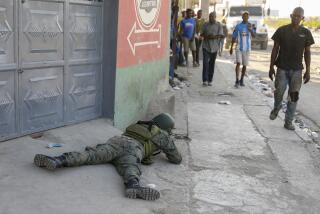Stumbling Toward a Showdown? : Clinton notches up pressure on Haiti
- Share via
President Clinton moved a step closer to resolving the domestic political problems Haiti is causing him by tapping former Rep. William H. Gray III as his special envoy to that nation.
Gray, head of the United Negro College Fund, will replace Lawrence A. Pezzullo, a U.S. Foreign Service officer whose efforts to help negotiate a settlement to the long and frustrating Haitian crisis were notably unsuccessful. With the ouster of a career diplomat in favor of a former congressman, there can be no clearer sign that, for now, the domestic ramifications of Haiti’s turmoil have taken priority over foreign- policy ones.
Of course, Haiti had become a political embarrassment for Clinton. Since taking office the President has been in the acutely uncomfortable position of maintaining a Bush Administration policy on Haitian refugees that candidate Bill Clinton had condemned. The hard-hearted policy allows the U.S. Coast Guard to return refugees intercepted at sea to their homeland.
The policy has come under fire from African Americans as well as refugee advocates. Contrasting it with the welcome mat the United States still has out for refugees from the Castro regime in Cuba, some critics even labeled the Haitian refugee policy racist. That criticism took a dramatic turn when prominent African American activist Randall Robinson, head of the foreign-policy lobbying group TransAfrica, protested with a hunger strike.
Thus it was no coincidence that Clinton, in announcing Gray’s appointment, also said he is ordering a policy change. Henceforth, Haitian refugees will be accorded asylum hearings at sea, rather than being automatically returned to authorities in Haiti for what could be a very cruel fate. Even if that results in asylum for only a few more Haitian refugees than is currently the case, the symbolism of Clinton’s action was enough to persuade Robinson to end his dramatic fast after 27 days.
But while Clinton may have resolved his domestic problems with regard to Haiti, he and the United Nations must still find some way to leverage the military junta that ousted President Jean-Bertrand Aristide in 1991 from power so that Aristide can return from exile. Last week’s U.N. decision to impose tighter economic sanctions was necessary. But those sanctions must be given some time to work before a suggested next step is seriously considered: military action against the Haitian junta by either a U.S., U.N. or even an exile force.
For while U.S. forces are fully capable of ousting the thugs who control Haiti--and that would surely be satisfying to many--military action might only compound the challenge of nation-building for a post-junta government. Thus far the Clinton Administration shows no signs of having cracked that part of the daunting Haitian dilemma.
More to Read
Sign up for Essential California
The most important California stories and recommendations in your inbox every morning.
You may occasionally receive promotional content from the Los Angeles Times.










